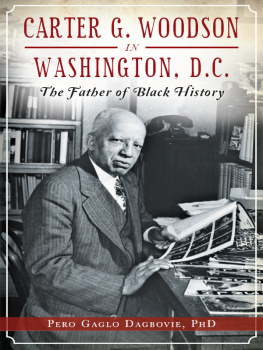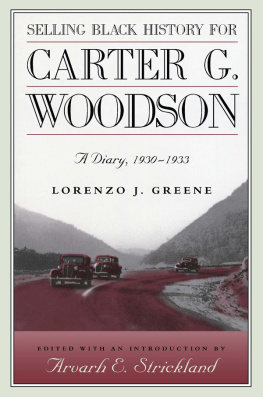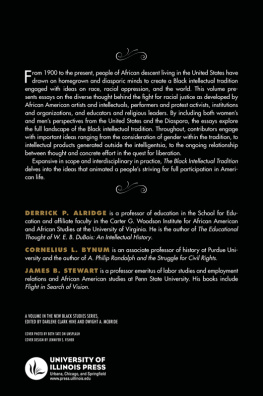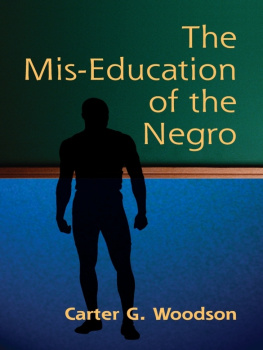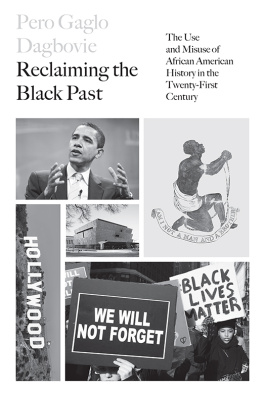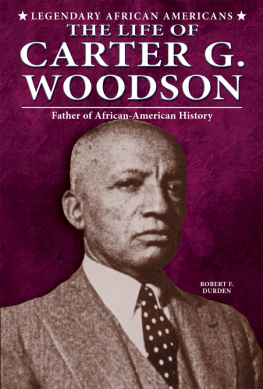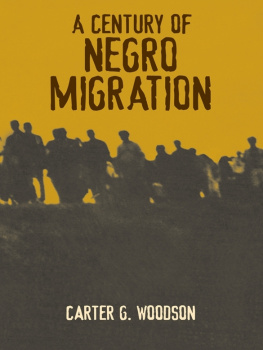
Published by The History Press
Charleston, SC 29403
www.historypress.net
Copyright 2014 by Pero Gaglo Dagbovie
All rights reserved
First published 2014
e-book edition 2014
ISBN 978.1.62585.164.2
Library of Congress Cataloging-in-Publication Data
Dagbovie, Pero Gaglo.
Carter G. Woodson in Washington, D.C. : the father of Black history / Pero Gaglo Dagbovie.
pages cm
Includes bibliographical references and index.
print edition ISBN 978-1-62619-630-8 (paperback)
1. Woodson, Carter Godwin, 1875-1950. 2. Woodson, Carter Godwin, 1875-1950--Homes and haunts--Washington (D.C.) 3. African American historians--Biography. 4. Historians--United States--Biography. 5. African Americans--Historiography. 6. Association for the Study of Negro Life and History, inc.--History. 7. Shaw (Washington, D.C.)--Biography. 8. Washington (D.C.)--Biography. 9. Washington (D.C.)--Intellectual life. I. Title. II. Title: Carter G. Woodson in Washington, DC.
E175.5.W65D34 2014
973.0496073007202--dc23
[B]
2014036949
Notice: The information in this book is true and complete to the best of our knowledge. It is offered without guarantee on the part of the author or The History Press. The author and The History Press disclaim all liability in connection with the use of this book.
All rights reserved. No part of this book may be reproduced or transmitted in any form whatsoever without prior written permission from the publisher except in the case of brief quotations embodied in critical articles and reviews.
In loving memory of my niece Melanie
She that dwelleth in the secret place of the most High shall abide under the shadow of the Almighty.
Psalms 91:1
One of the most inspiring and instructive stories in Black history is the story of how Carter G. Woodson, the Father of Black History, saved himself for the history he saved and transformed.
The skeletal facts of his personal struggle for light and of his rise from the coal mines of West Virginia to the summit of academic achievement are eloquent in and of themselves
For in an extraordinary career spanning three crucial decades, the man and the history became oneso much so that it is impossible to deal with the history of Black people without touching, at some point, the personal history of Carter G. Woodson, who taught the teachers, transformed the vision of the masses and became, almost despite himself, an institution, a cause, and a month. One could go further and say that the systematic and scientific study of Black history began with Woodson, who almost single-handedly created the Association for the Study of Negro Life and History (now the Association for the Study of Afro-American Life and History) and the prestigious Journal of Negro History. Not content with these achievements, he ventured into the field of mass education, creating annual Black history celebrations.
What makes this so remarkable is that Woodson created these cultural monuments largely by his own efforts.
Lerone Bennett Jr., 1999
CONTENTS
PREFACE
I wrote Carter G. Woodson in Washington, D.C.: The Father of Black History to serve as an accessible and brief book for all those interested in the life and contributions of Carter G. Woodson and the historical significance of the Carter G. Woodson Home, National Historic Site (NHS). This book should be especially useful to those who visit the Woodson Home and are further intrigued by its history and Woodson himself. From 1922 until 1950, Woodsons three-story Victorian-style row house in Washington, D.C.s vibrant Shaw neighborhood, also called Black Broadway, was the headquarters for the Association for the Study of Negro Life and History (ASNLH) and the Associated Publishers, Inc., as well as the epicenter of the early black history movement.
In a tribute to the man also known as the Father of Black History, the Residence of the Phyllis Wheatley YWCA, 901 Rhode Island Avenue, Washington, D.C., declared: We deeply appreciated having known Dr. Woodson, who was truly The House by the Side of the Road. These Washingtonians sampled from a famous 1899 poem by humanitarian, librarian and common man poet Sam Walter Foss to describe their humble friend who routinely ate dinner with them. The central character of Fosss poem happily lived in a house by the side of the road, strove to help others and was, in essence, a friend to man.
After earning a PhD in history from Harvard University in 1912 during an era of widespread Jim Crow segregation, Woodson played an unprecedented role in laying the foundations for the systematic study of African American history. An extraordinary organizer and motivator with a herculean work ethic (an eighteen-hour workday seemed routine for him), Woodson was a quintessential educational reformer and innovator who used history as an effective tool for generating wide-reaching social and cultural change. By the early 1920s, Woodson wholeheartedly devoted his life to maintaining the ASNLH, publishing scholarship on black American and Afro-diasporic history, training younger black scholars, popularizing black history and speaking out for blacks civil rights. After he delivered the 1947 Founders Day speech at Virginia Union University, Dean Gordon B. Hancock accurately dubbed Woodson the high priest of Negro history. The founder of Negro History Week (which developed into what we celebrate today as National African American History Month) in 1926, Woodson was, simply put, a black history institution builder.
Without reservations, I admit that I admire Woodsons accomplishments. At the same time, I acknowledge and recognize that above all else Woodson was a human being and a complex, many-sided man. Described by a 1930 editorial in the Afro-American (Baltimore) as the strange Harvard bachelor whose only true love has been his devotion to historical truth, Woodson himself acknowledged his peculiar personality. In the mid-1920s, he told one of his co-workers: I suppose you have heardthat I am eccentric, that I do things in fits and starts. Woodson was, indeed, no ordinary person. In the process of validating his peoples past, he left his imprints deeply embedded within the walls of American culture. Historian Charles H. Wesley, the third African American to earn a PhD in history at Harvard University (in 1925), dramatically and effectually contextualized his elders achievements in his 1951 essay Carter G. WoodsonAs a Scholar. Wesley observed:
We are almost too close in time to present an accurate view of Carter G. Woodson among scholars. The measure of the achievement of one whom we consider as a great scholar can be made with completeness not only by his work but also through the critical and creative achievements along similar lines of a subsequent generation of scholars. These scholars draw upon his discoveries and conclusions and build paths leading to truths. Smoller, the German historian, has stated that History is in league with genius. In other words, as the nation and the people pass along the years, the individual and his work grow the greater. Then it becomes difficult to separate fact from fiction. The lives of the great men of American History have been of this pattern of developing halo and glory. Men and women who are often discounted or regarded as average persons develop with the passing years into those who are greater. Truly, in this respect, history is in league with genius.
This fundamental principle of our history makes itself manifest in the life and career of Carter G. Woodson. However, in his case we do not have to wait for the years to place him among the scholars, although we do not know how the future will rank all his historical writings. The discovery of new historical materials, the re-interpretations and the re-writing of history have led to re-appraisals of many a mans work. Nevertheless, we can now make our appraisal, with certainty, concerning Woodson. We do not have to ask for the fictionist, the poet and the builders of dreams to create his greatness. He has been a builder of his own monument
Next page
